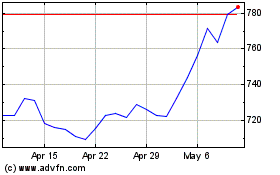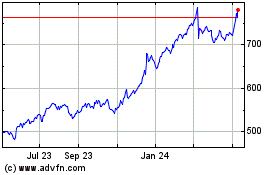Wal-Mart Rolls Out a New Worker Scheduling System
August 04 2016 - 5:10PM
Dow Jones News
Wal-Mart Stores Inc. is trying out a new scheduling system in
hundreds of stores to give store employees more control over their
hours as it seeks to address worker discontent around unpredictable
scheduling without increasing its labor costs.
The retailer, which has 1.5 million U.S. employees, has put the
new system into about 650 of its Neighborhood Market stores in the
past month and could eventually use it in all of its approximately
4,600 U.S. locations, a Wal-Mart spokesman said.
Under the changes, some full-time and part-time employees will
be able to have a fixed schedule for at least six months, a rare
offer in the retail industry, where employees are often given
little notice about shift changes. Other employees will stay on the
current regime, getting three weeks advanced notice of their
schedules. But the new software should better predict staffing
demands to give store managers and employees real-time information
on open shifts and staffing changes, the spokesman said.
The change makes good on a promise Wal-Mart made in 2014 when it
announced plans to raise the minimum wage for store employees. At
that time it said it would give some employees fixed schedules by
this year. The goal is to give workers greater sway over their
schedules and more clearly communicate when they can work open
shifts.
The new system "is set up so people don't think they have to
tell Wal-Mart I am able to work at any time to get enough hours,"
the spokesman said. "We want to get away for that."
An employee advocacy group, Our Wal-Mart, said employee control
over scheduling is a huge issue for the industry. "If Wal-Mart is
moving away from the pattern that is happening, it is a big shift,"
said Dan Schlademan, the group's co-director.
Wal-Mart doesn't use on-call scheduling, a system that is
widespread in retail in which employees are told to come to work or
stay home with little notice. But in Wal-Mart's case, employees
fear that if they limit their available hours, they won't be given
enough shifts, Mr. Schlademan said.
As the country's largest private employer, a change at Wal-Mart
can set the tone for the industry. When it announced in 2014 it
would raise store employee's minimum wage, other retailers followed
suit, including Target Corp. and Costco Wholesale Corp.
Traditional retailers are confronting a raft of labor
challenges, including rising wages and new demands on their
workforce as they cater to the needs of online shoppers. In
addition, labor costs at store registers are rising because
Check-Out times have slowed amid a shift to new credit-card
technology that requires shoppers to insert their cards into a
machine, instead of swiping.
The new Wal-Mart scheduling system is the latest in wider
changes the retailer is making in stores to improve customer
service and make operations more efficient, like bringing back
greeters to store entrances and reducing inventory.
Wal-Mart views the new scheduling system as a test for now. "You
don't want to roll something out that doesn't quite work to 5,000
stores at the same time," the spokesman said. The retailer is
soliciting employee and manager feedback, he said.
Write to Sarah Nassauer at sarah.nassauer@wsj.com
(END) Dow Jones Newswires
August 04, 2016 16:55 ET (20:55 GMT)
Copyright (c) 2016 Dow Jones & Company, Inc.
Costco Wholesale (NASDAQ:COST)
Historical Stock Chart
From Mar 2024 to Apr 2024

Costco Wholesale (NASDAQ:COST)
Historical Stock Chart
From Apr 2023 to Apr 2024
